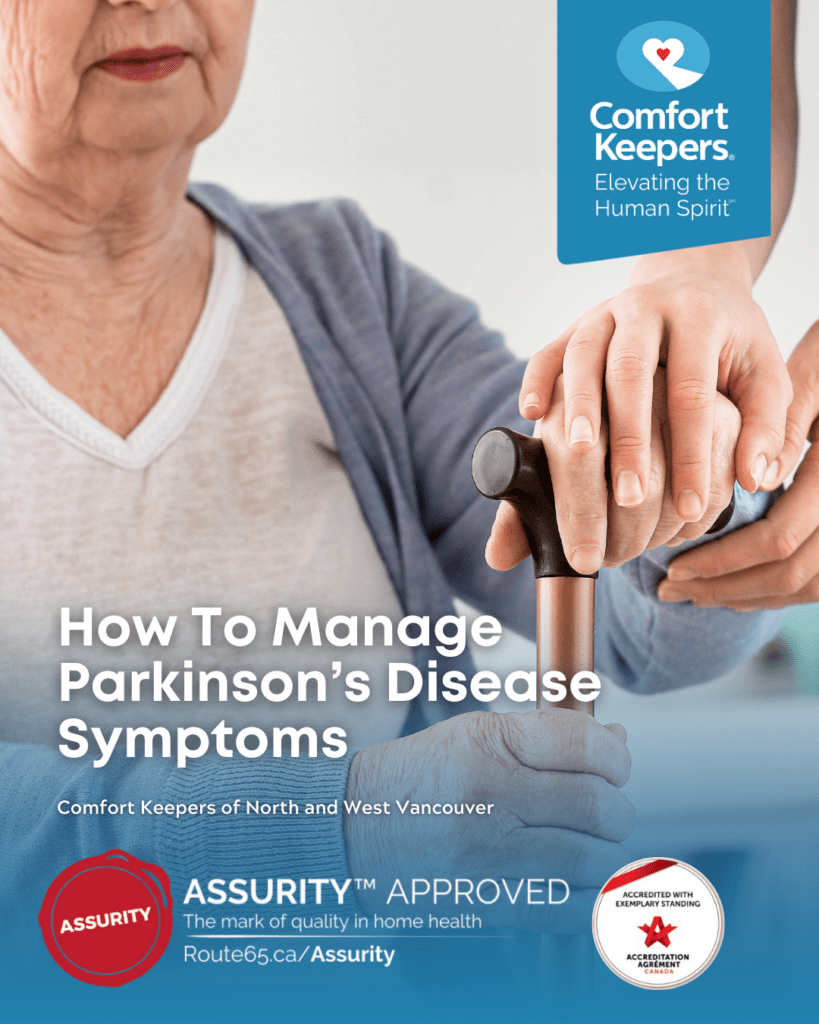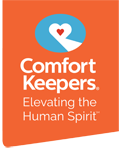Managing Parkinson’s Disease Symptoms
Senior In-Home Care | April 16, 2025

What Every Senior in North and West Vancouver, BC Needs to Know About Parkinson’s Disease
What do you need to know about managing Parkinson’s Disease symptoms? Parkinson’s Disease affects 1 in every 500 people in Canada; most people diagnosed are over the age of 60. Parkinson’s disease affects both men and women. Statistically, however, men have a slightly higher chance of developing the disease. The risk of developing Parkinson’s disease also increases with age, with the average age of onset being 65 years.
#DYK: Over 100,000 Canadians are living with Parkinson’s today and approximately 6,600 new cases of PD are diagnosed each year in Canada
While there is no known cure for Parkinson’s, taking steps to manage the disease can increase a senior’s quality of life and help to reduce the impact of symptoms.
Parkinson’s Disease Can Manifest in the Following Ways:
- Tremors
- Balance problems
- Cognitive impairment
- Mood disorders
- Short steps and slowed movement (bradykinesia)
- Speech and writing changes
Those that have been diagnosed with Parkinson’s should discuss management strategies with a healthcare professional. There are a variety of medications and therapies that a doctor can recommend.
Four Everyday Symptom Management Strategies Can Include:
#1. Finding Ways to Relieve Stress:
There is ample evidence that stress can make symptoms worse. However, they usually return to normal levels once the cause of stress is removed. Activities that can help reduce stress include meditation, yoga, deep breathing, getting outside, spending time with loved ones, participating in hobbies or physical activity approved by a physician.
#2. Maintaining a Good Diet:
For those with Parkinson’s, proper nutrition will not only help manage symptoms, but can help slow the progression of the disease in some seniors. In addition to healthy, nutritious food, it’s important to prevent dehydration too.
#3. Adapting Your Home:
Depending on the Parkinson’s symptoms that someone is experiencing, there are a variety of ways to improve everyday life with a few adjustments to living space. For those with trouble walking, or those that need a wheelchair, wide walkways help manage mobility. Mattresses with adjustable features can be helpful for anyone with difficulty getting in and out of bed, and grab bars may be helpful for those with balance issues.
#4. Preventing Falls:
Having trouble walking is a common Parkinson’s disease symptom. Minimizing fall risk is an important safety management strategy that is easy to execute. Wearing proper footwear, making sure rooms are properly lit and removing trip hazards can all help reduce the risk of falls.
Comfort Keepers® Can Help with Managing Parkinson’s Disease Symptoms
For those who need extra help, in-home caregivers can help facilitate stress management activities, provide support for physician-approved diet and exercise plans and will evaluate a home for safety as part of an in-home assessment.
Caregivers can also help with mobility, improve home safety, provide transportation to appointments and events and can help seniors maintain positive mental health through connection, engagement, and companionship.
The Best Senior Home Assistance Care in North and West Vancouver is Comfort Keepers®
Our senior home care agency offers in-home care focusing on aging in place. Our services include dementia care, end-of-life care, post-surgery care, and palliative care. Comfort Keepers can assist seniors with living transition services, personal care, companionship care, and more!
Quality and Accredited Elderly Care: Happier, Healthier, and at Home with 24/7 Senior Care Opportunities!
Do you need a home care solution for yourself or a loved one? Have you been thinking about retirement homes and their alternatives as a solution? Comfort Keepers® enables seniors to maintain happy, healthy lives in the comfort of their own homes. In-home care services are available in North Vancouver, West Vancouver, and the surrounding areas.
Comfort Keepers® is a Senior Care Agency That Can Make a Difference with Interactive Caregiving™
Our in-home caregivers ensure our senior clients have the best quality of life. The Interactive Caregiving™ program ensures that a senior’s safety, nutrition, mental well-being, and everyday needs are met. This program brings joy and good health to each client’s home.
Comfort Keepers® North Vancouver and West Vancouver Can Help with In-Home Elderly Care Services!
If you are concerned about the health and well-being of a loved one we can help! Comfort Keepers offers 24-hour care and delivers top-quality and compassionate care for seniors. We are dedicated to safety technology solutions that foster independence and enhance well-being.
Locally Owned and Operated Home Health Care Agency
Our care centers around companionship for seniors. Empathetic care originates from the soul and allows us to meet our client’s requirements. The seasoned in-home caregivers employed by Comfort Keepers are carefully chosen based on their empathetic qualities.
Contact the Comfort Keepers® North Vancouver and West Vancouver office at (604) 998-8806 to learn more about our unique in-home care solutions for seniors.
Comfort Keepers is an Accredited Senior Care Agency in North and West Vancouver, BC
Accreditation is a rigorous process that involves industry experts evaluating an organization’s processes, policies, and procedures. Comfort Keepers® North and West Vancouver has been awarded Exemplary Standing by Accreditation Canada. This achievement recognizes that Comfort Keepers® meets or exceeds the stringent quality standards for Home Care companies established by Accreditation Canada.
References
Mayo Clinic. “Parkinson’s Disease.” Web. 2018.
UCB Canada. “Parkinson’s Disease.” Web. 2019.
WebMD. “Parkinson’s Disease Guide: Living & Managing.” Web.
Parkinson’s Foundation. “Statistics.” Web. 2016.
Individualized Home Care Options
Long-Term Home Care, 24 Hour Home Care & Short Term Care Options Customized for You





